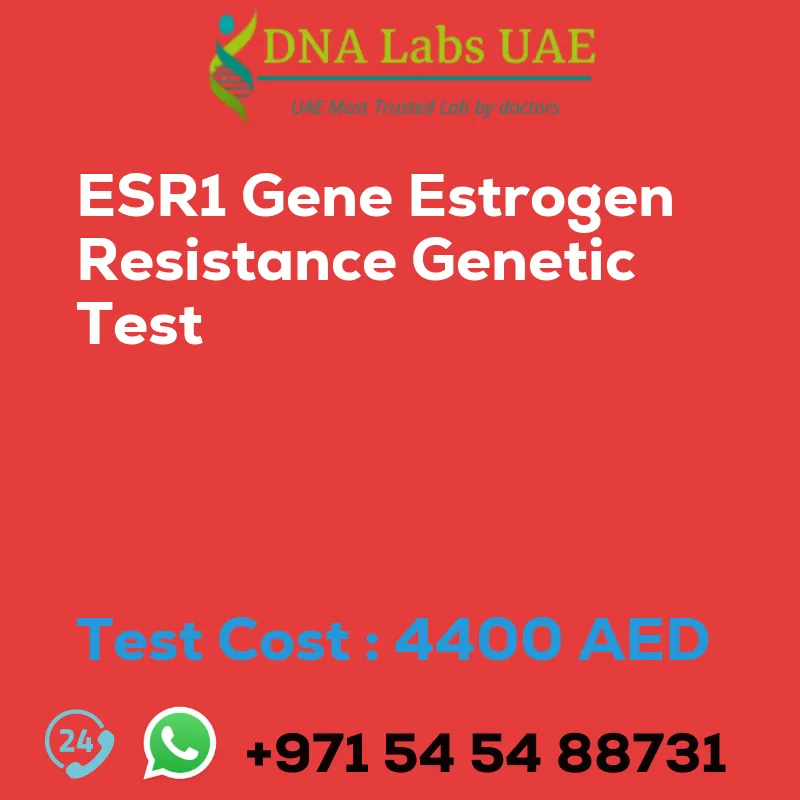ESR1 Gene Estrogen Resistance Genetic Test
Test Name: ESR1 Gene Estrogen Resistance Genetic Test
Components: DNA Labs UAE
Price: 4400.0 AED
Sample Condition: Blood or Extracted DNA or One drop Blood on FTA Card
Report Delivery: 3 to 4 Weeks
Method: NGS Technology
Test Type: Hepatology Nephrology Endocrinology Disorders
Doctor: General Physician
Test Department: Genetics
Pre Test Information: Clinical History of Patient who is going for ESR1 Gene Estrogen resistance NGS Genetic DNA Test. A Genetic Counselling session to draw a pedigree chart of family members affected with ESR1 Gene Estrogen resistance NGS Genetic DNA Test gene ESR1
Test Details
The ESR1 gene, also known as the estrogen receptor 1 gene, plays a crucial role in mediating the effects of estrogen in the body. Mutations or alterations in this gene can lead to estrogen resistance, meaning that the body does not respond properly to estrogen.
NGS, or next-generation sequencing, is a powerful genetic testing technique that allows for the rapid and comprehensive analysis of a person’s genetic material. It can be used to identify mutations or variations in the ESR1 gene that may be associated with estrogen resistance.
A genetic test for ESR1 gene estrogen resistance using NGS involves obtaining a sample of DNA, typically through a blood sample or cheek swab. The DNA is then sequenced using next-generation sequencing technology to identify any variations or mutations in the ESR1 gene.
The results of the test can help healthcare professionals determine if a person has a genetic predisposition to estrogen resistance. This type of genetic test may be useful for individuals who exhibit symptoms of estrogen resistance, such as delayed puberty, infertility, or abnormal menstrual cycles.
It can also be used for genetic counseling purposes, allowing individuals to make informed decisions about their reproductive health and treatment options.
It is important to note that while genetic testing can provide valuable information, it is not a definitive diagnosis for estrogen resistance. Other factors, such as clinical symptoms and medical history, should be considered in conjunction with genetic test results to make an accurate diagnosis and develop an appropriate treatment plan.
| Test Name | ESR1 Gene Estrogen resistance Genetic Test |
|---|---|
| Components | |
| Price | 4400.0 AED |
| Sample Condition | Blood or Extracted DNA or One drop Blood on FTA Card |
| Report Delivery | 3 to 4 Weeks |
| Method | NGS Technology |
| Test type | Hepatology Nephrology Endocrinology Disorders |
| Doctor | General Physician |
| Test Department: | Genetics |
| Pre Test Information | Clinical History of Patient who is going for ESR1 Gene Estrogen resistance NGS Genetic DNA Test. A Genetic Counselling session to draw a pedigree chart of family members affected with ESR1 Gene Estrogen resistance NGS Genetic DNA Test gene ESR1 |
| Test Details |
The ESR1 gene, also known as the estrogen receptor 1 gene, plays a crucial role in mediating the effects of estrogen in the body. Mutations or alterations in this gene can lead to estrogen resistance, meaning that the body does not respond properly to estrogen. NGS, or next-generation sequencing, is a powerful genetic testing technique that allows for the rapid and comprehensive analysis of a person’s genetic material. It can be used to identify mutations or variations in the ESR1 gene that may be associated with estrogen resistance. A genetic test for ESR1 gene estrogen resistance using NGS involves obtaining a sample of DNA, typically through a blood sample or cheek swab. The DNA is then sequenced using next-generation sequencing technology to identify any variations or mutations in the ESR1 gene. The results of the test can help healthcare professionals determine if a person has a genetic predisposition to estrogen resistance. This type of genetic test may be useful for individuals who exhibit symptoms of estrogen resistance, such as delayed puberty, infertility, or abnormal menstrual cycles. It can also be used for genetic counseling purposes, allowing individuals to make informed decisions about their reproductive health and treatment options. It is important to note that while genetic testing can provide valuable information, it is not a definitive diagnosis for estrogen resistance. Other factors, such as clinical symptoms and medical history, should be considered in conjunction with genetic test results to make an accurate diagnosis and develop an appropriate treatment plan. |








